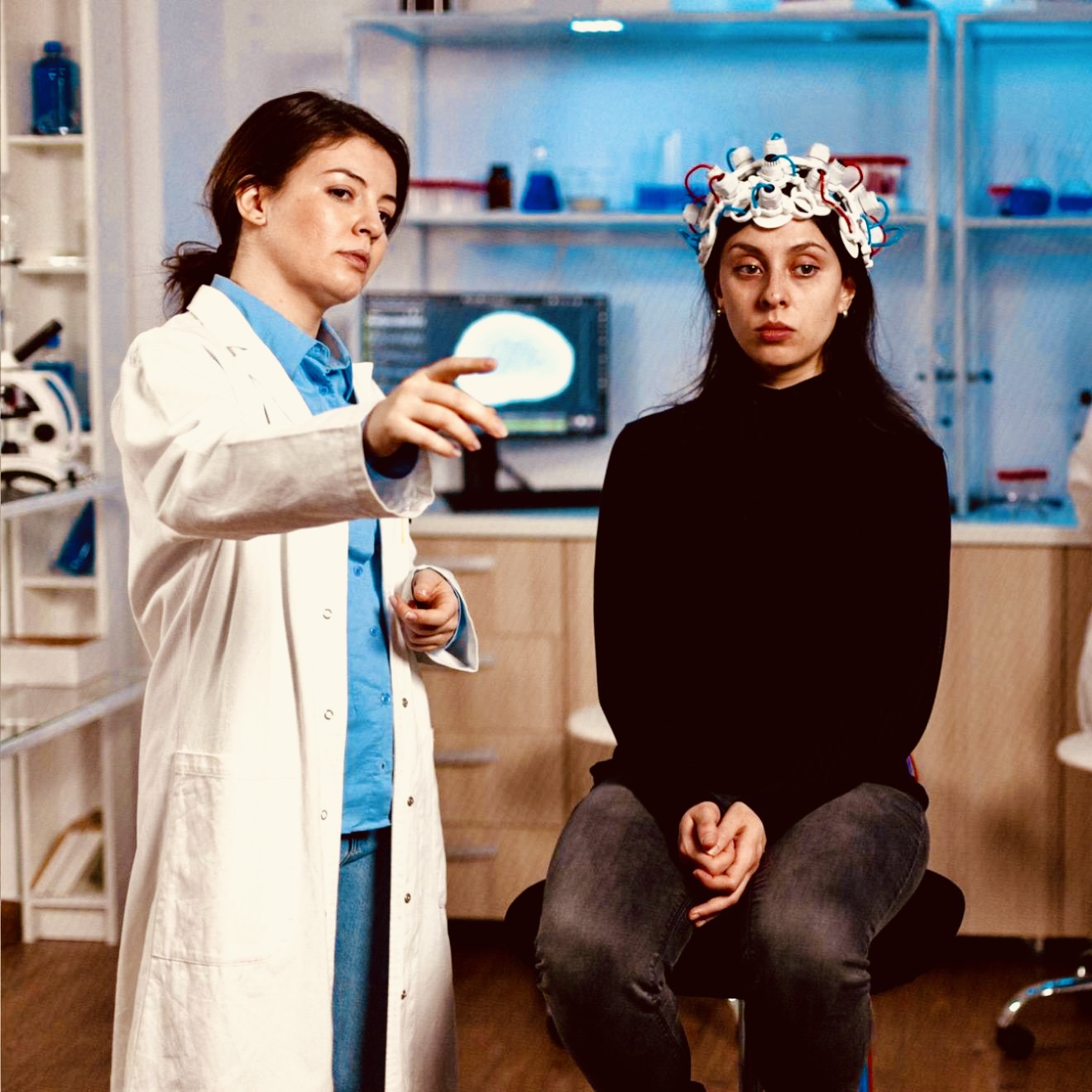
Insights on psychiatry, clinical tools, and digital care

 Psychiatry
Psychiatry Mental Health
Mental HealthDifference between Psychiatry and Mental Health
Psychiatry is a medical specialty focused on diagnosing, treating, and preventing mental, emotional, and behavioral disorders, often using medications and medical evaluations. Mental health encompasses overall psychological well-being, including emotional, psychological, and social factors, and involves a broader range of professionals and approaches aimed at maintaining and improving mental wellness.

 Psychiatry
Psychiatry Mental Health
Mental HealthPsychologists versus Psychiatrists
Psychologists and psychiatrists are both mental health professionals, but they have different educational backgrounds and approaches to treatment. Psychologists typically hold a doctoral degree in psychology and focus on psychotherapy and behavioral interventions, while psychiatrists are medical doctors who can prescribe medication and address the biological aspects of mental health conditions.

 Psychiatry
Psychiatry Awareness
AwarenessMeasurable Parameters for a Good Diagnosis
Measurable parameters are crucial for ensuring a good diagnosis, providing a reliable foundation for effective treatment and patient care. This means distinguishing between diseases with similar symptoms and pinpointing the exact nature of the patient's ailment.

 Psychiatry
Psychiatry Awareness
AwarenessBarriers to Psychiatric Diagnosis
Barriers to psychiatric diagnosis include stigma and social perceptions that discourage individuals from seeking help, symptom overlap among disorders, and comorbidity that complicates accurate identification. Additionally, the lack of standardized diagnostic tools, subjectivity in diagnosis, and cultural factors can impede effective diagnosis, affecting the quality of care and treatment outcomes.

 Psychiatry
Psychiatry Awareness
AwarenessIntegrating Pathology and Symptomology
Combining pathology and symptomology offers a robust approach to psychiatric diagnosis, enhancing the accuracy, comprehensiveness, and personalization of care. This integration ensures that both the biological underpinnings and the subjective experiences of patients are considered in diagnosis and treatment planning.

 Psychiatry
Psychiatry Awareness
AwarenessRole of Caregivers and Support Groups
The involvement of caregivers and support groups in psychiatric care is invaluable. They provide a multi-dimensional support system that addresses emotional, practical, and informational needs, enhancing the overall treatment and recovery process for psychiatric patients.

 Psychiatry
Psychiatry Awareness
AwarenessDaily Life of a Psychiatric Patient
The daily life of a psychiatric patient involves managing self-care, medication, nutrition, sleep, and physical activity to maintain overall well-being. They also participate in therapeutic activities, social interactions, and structured lifestyles to support mental health stability. Access to a support system and Resources for crisis management is crucial for their day-to-day living.

 Core Diagnostic Category
Core Diagnostic Category DSM-5
DSM-5Anxiety Disorders
Anxiety is a common, yet often misunderstood, emotion. This article delves into the intricacies of anxiety disorders, offering compassionate and informed perspectives on symptoms, causes, coping strategies, and professional treatments. Discover how to manage anxiety and lead a fulfilling life.

 Core Diagnostic Category
Core Diagnostic Category DSM-5
DSM-5Depression Disorders
Depression, a condition often shrouded in mystery and misconceptions, warrants a deeper understanding. This article aims to shed light on the various facets of depression, exploring its causes, symptoms, impacts, and treatment options. Discover how to manage depression effectively and embark on a journey toward recovery and wellness.

 Core Diagnostic Category
Core Diagnostic Category DSM-5
DSM-5Bipolar Disorders
Bipolar disorder, marked by extreme mood swings, affects millions worldwide. This article delves into the symptoms, types, diagnosis, and management of bipolar disorder, offering insights to better navigate this complex condition. Discover how to support those affected and foster a more empathetic environment.

 Core Diagnostic Category
Core Diagnostic Category DSM-5
DSM-5Schizophrenia Disorders
Schizophrenia, a complex and often misunderstood mental health condition, affects how individuals perceive reality. This article provides comprehensive insights into the symptoms, causes, impact, and treatment options for schizophrenia, aiming to demystify the condition and foster understanding and empathy.

 Core Diagnostic Category
Core Diagnostic Category DSM-5
DSM-5Substance Abuse
Substance abuse is a complex issue impacting individuals and societies worldwide. This article delves into the causes, impacts, and recovery processes of substance abuse, highlighting prevention strategies and the importance of support systems. Discover innovative treatments and personal stories of recovery.

 Core Diagnostic Category
Core Diagnostic Category DSM-5
DSM-5Medication Abuse
Medication abuse has emerged as a significant challenge, affecting individuals across all demographics. This article explores the various facets of medication abuse, its causes, effects, and strategies for prevention and recovery. Discover how to combat this issue and promote a healthier society.

 Core Diagnostic Category
Core Diagnostic Category DSM-5
DSM-5Gambling Disorder
Gambling, often seen as a harmless pastime, can escalate into a debilitating mental disorder. This article explores the psychological nuances of gambling addiction, its impact on mental health, and the journey towards recovery. Learn how to recognize and prevent gambling addiction effectively.

 Core Diagnostic Category
Core Diagnostic Category DSM-5
DSM-5Trauma and Stress Disorders
Trauma and stress disorders are intricate psychological conditions arising from distressing events. This article explores their causes, symptoms, treatments, and coping strategies, providing compassionate insights to help manage these conditions and improve quality of life.

 Core Diagnostic Category
Core Diagnostic Category DSM-5
DSM-5Somatic Symptoms Disorders
Somatic symptoms, often complex and misunderstood, manifest physically but are connected to psychological factors. This article delves into the intricacies of somatic symptoms, exploring their causes, symptoms, treatment options, and the impact of stress and lifestyle changes on managing these conditions.

 Core Diagnostic Category
Core Diagnostic Category DSM-5
DSM-5Feeding, Eating, and Elimination Disorders
In the intricate tapestry of mental health, disorders related to feeding, eating, and elimination often go unnoticed or misunderstood. This article sheds light on these conditions, exploring their origins, manifestations, and pathways to healing. Discover the complexities and treatment strategies to manage these disorders effectively.

 Core Diagnostic Category
Core Diagnostic Category DSM-5
DSM-5Sleep-Wake Disorders
Sleep-wake related mental disorders represent a fascinating yet often overlooked area in mental health. This article explores their causes, symptoms, and effective treatments, shedding light on their impact on overall mental well-being. Discover the importance of awareness and management strategies.

 Core Diagnostic Category
Core Diagnostic Category DSM-5
DSM-5Dissociative Disorders
Dissociative mental disorders represent a complex spectrum of conditions where a person's consciousness, memory, identity, or perception of the environment becomes disconnected from reality. This article delves into the types, symptoms, causes, and treatment options for dissociative disorders, offering insights on managing and supporting those affected.

 Core Diagnostic Category
Core Diagnostic Category DSM-5
DSM-5Neurocognitive Disorders
Neurocognitive disorders, previously known as dementia, affect cognitive functions like memory, attention, and problem-solving. This article explores causes, symptoms, types, and management strategies to provide a comprehensive and empathetic understanding of these conditions. Discover how to manage neurocognitive disorders effectively.

 Core Diagnostic Category
Core Diagnostic Category DSM-5
DSM-5Neurodevelopmental Disorders
Neurodevelopmental disorders are a group of conditions manifesting early in childhood, affecting personal, social, academic, or occupational functioning. This article explores types, causes, impacts, and treatments, offering insights into support and integration for those affected.

 Core Diagnostic Category
Core Diagnostic Category DSM-5
DSM-5Obsessive-Compulsive Disorders
Obsessive-Compulsive Disorder (OCD) is a complex condition characterized by persistent, unwanted thoughts and repetitive behaviors. This article provides an in-depth look at OCD, covering symptoms, causes, treatments, and its impact on daily life. Discover effective management strategies for living with OCD.

 Core Diagnostic Category
Core Diagnostic Category DSM-5
DSM-5Personality Disorders
Personality disorders are complex mental health conditions characterized by enduring patterns of behavior and cognition. This article provides a comprehensive insight into types, diagnosis, impact, and treatment approaches, emphasizing the importance of support systems and future research directions.

 Core Diagnostic Category
Core Diagnostic Category DSM-5
DSM-5Disruption, Impulse-Control, and Conduct Disorders
Disruption, Impulse-Control, and Conduct disorders significantly impact individuals' social, emotional, and cognitive functioning. This article explores the symptoms, causes, societal impacts, and treatment options for these complex disorders. Discover strategies for effective management and support.

 Core Diagnostic Category
Core Diagnostic Category DSM-5
DSM-5Sexual Dysfunctions
Sexual dysfunction, often surrounded by uncertainty and discomfort, needs a compassionate exploration. This article aims to demystify sexual dysfunctions by discussing their causes, impacts, treatment options, and the role of psychological and physical health.

 Core Diagnostic Category
Core Diagnostic Category DSM-5
DSM-5Paraphilic Disorders
Paraphilic disorders, often misunderstood and stigmatized, are psychiatric conditions involving atypical sexual interests that can lead to distress or harm. This article explores their nature, causes, and treatment, emphasizing the need for compassionate understanding.

 Core Diagnostic Category
Core Diagnostic Category DSM-5
DSM-5Gender Dysphoria
Gender dysphoria represents a unique challenge for many individuals. This article provides a comprehensive understanding of gender dysphoria, its psychological impacts, coping strategies, and the importance of societal awareness and support. Discover ways to navigate and support this journey.

 Individual Setting
Individual Setting Group Setting
Group Setting Family Setting
Family SettingBehavior Therapy
Behavior therapy focuses on modifying harmful behaviors through structured techniques like reinforcement and exposure. It's highly effective for treating anxiety, phobias, and other psychological issues.

 Individual Setting
Individual Setting Group Setting
Group SettingAssertiveness Training
Assertiveness training helps individuals communicate more effectively and confidently. This therapeutic approach is crucial for improving interpersonal relationships and enhancing overall mental health.

 Individual Setting
Individual SettingAversion Therapy
Aversion Therapy, is a powerful approach to modifying harmful behaviors by creating negative associations. This technique is especially useful for addressing addictions and harmful habits.

 Individual Setting
Individual SettingEye Movement Desensitisation and Reprocessing
Eye Movement Desensitisation and Reprocessing (EMDR) is designed to alleviate distress associated with traumatic memories. It has gained recognition for its effectiveness in treating PTSD and other trauma-related conditions.

 Individual Setting
Individual SettingFlooding
Flooding is a powerful technique designed to help individuals confront and overcome their fears. This approach has proven effective in treating phobias and anxiety disorders, making it a valuable tool in mental health treatment.

 Individual Setting
Individual SettingImplosion Therapy
Implosion therapy, a form of behavior therapy, focuses on exposing patients to their fears in a controlled and safe environment. This method aims to reduce anxiety and phobias by confronting them directly, providing significant mental health benefits.

 Individual Setting
Individual Setting Group Setting
Group SettingHabit Reversal Treatment
Habit Reversal Treatment (HRT) is a well-established approach designed to help individuals modify unwanted behaviors and habits. This therapy is especially effective in treating repetitive behaviors and improving overall mental well-being.

 Individual Setting
Individual Setting Group Setting
Group SettingParticipant Modeling
Participant Modeling, is a powerful technique used to help individuals learn new behaviors by observing and imitating others. This approach is widely recognized for its effectiveness in treating various psychological issues.

 Individual Setting
Individual Setting Group Setting
Group SettingSocial Skills Training
Social skills training focuses on improving interpersonal skills and communication through structured interventions. This approach is particularly beneficial for individuals struggling with social interactions and aims to enhance their overall social functioning and relationships.

 Individual Setting
Individual Setting Group Setting
Group SettingToken Economy
Token Economy is an effective technique that rewards positive behaviors with tokens that can be exchanged for desired items or privileges. This method is widely used to encourage desirable behaviors and discourage negative ones, particularly in educational and therapeutic settings.

 Individual Setting
Individual SettingVirtual Therapy Treatment
Virtual therapy treatment, also known as online therapy, is a modern approach to psychotherapy that leverages technology to provide mental health support. This method is gaining popularity for its convenience and accessibility, making it an important option for mental well-being.

 Individual Setting
Individual SettingBiofeedback
Biofeedback is a powerful therapeutic technique that helps individuals gain control over physiological functions through real-time feedback. This method has proven effective for managing stress, anxiety, and various physical health issues.

 Individual Setting
Individual SettingAcupuncture
Acupuncture is an ancient Chinese practice that involves inserting thin needles into specific points on the body. It aims to balance energy flow and promote healing, making it a popular complementary therapy for various health conditions.

 Individual Setting
Individual SettingNeuromuscular Rehabilitation
Neuromuscular rehabilitation is a specialized form of therapy aimed at improving the function and quality of life for individuals with neuromuscular disorders. This therapy utilizes various techniques to enhance muscle function, coordination, and overall mobility.

 Individual Setting
Individual Setting Group Setting
Group Setting Family Setting
Family SettingCognitive Behavior Therapy
Cognitive Behavior Therapy (CBT) is a widely used form of psychotherapy that focuses on changing negative thought patterns and behaviors. It is highly effective in treating a variety of mental health issues and is known for its structured approach.

 Individual Setting
Individual Setting Group Setting
Group SettingDialectical Behavior Therapy
Dialectical Behavior Therapy (DBT) is a type of cognitive-behavioral therapy designed to help people manage their emotions and develop healthier coping mechanisms. It is especially beneficial for individuals with borderline personality disorder and other emotional regulation issues.

 Individual Setting
Individual Setting Family Setting
Family SettingFamily Therapy
Family therapy is a type of psychotherapy designed to help family members improve communication and resolve conflicts. This therapeutic approach is essential for fostering healthy family dynamics and enhancing overall mental well-being.

 Group Setting
Group SettingGroup Therapy
Group therapy, a powerful form of psychotherapy, involves a therapist working with several individuals simultaneously. This approach leverages group dynamics to foster growth and support among participants, making it a valuable tool for mental health and well-being.

 Individual Setting
Individual Setting Group Setting
Group SettingGuided Imagery
Guided imagery is a powerful form of psychotherapy that uses visualization techniques to promote mental and physical well-being. This therapeutic approach leverages the mind-body connection to foster healing and personal growth.
Try XYCHIATRY today
- See how it works in real-time. Take a quick self-assessment or walk through a sample patient case. No signup required.

